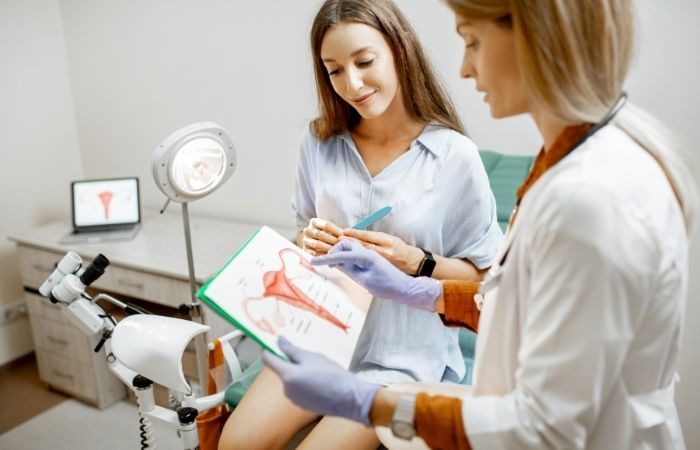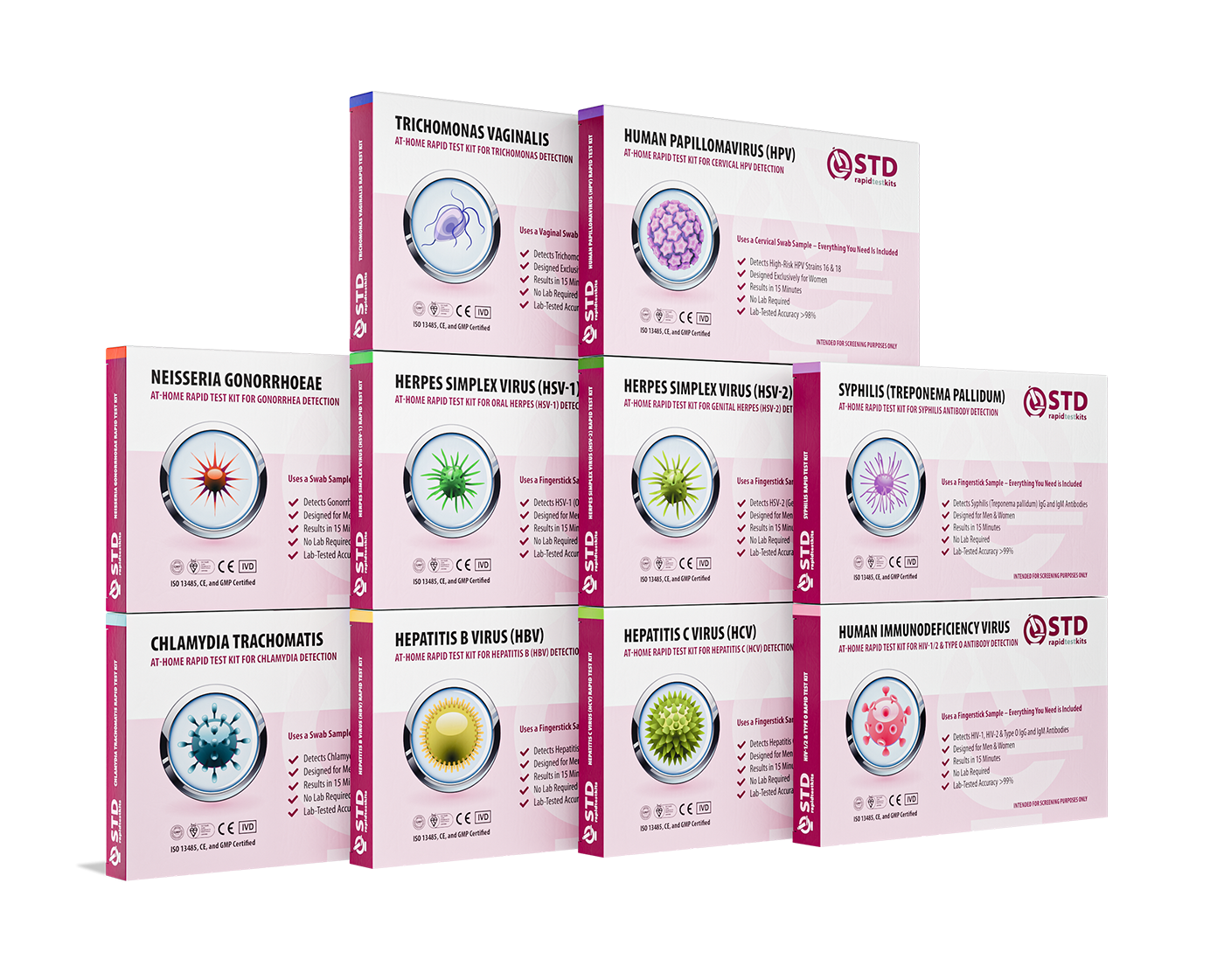Planning a pregnancy or already expecting? You’re probably tracking ovulation, googling prenatal vitamins, and cutting back on caffeine. But here’s one thing most women overlook, getting tested for STDs. It’s not about shame or suspicion, it’s about protection. Because some of the most dangerous infections during pregnancy show zero symptoms... until it’s too late.
Let’s break down how common STDs can affect your ability to get pregnant, and what happens if you're already pregnant and unaware of an infection. This is the no-fluff, medically-backed guide every woman in her childbearing years needs.

People are also looking for: She Gave Me Her Heart… and Herpes
Why STDs Matter During Pregnancy (Even If You Feel Fine)
Here’s the truth bomb: Many STDs don’t announce themselves with painful symptoms. That’s why they’re called “silent infections.” But just because you feel fine doesn’t mean your reproductive system is.
- Chlamydia and Gonorrhea: Can damage fallopian tubes, cause ectopic pregnancy, or lead to premature labor if untreated.
- Syphilis: Can pass to your baby and cause stillbirth or severe developmental issues (congenital syphilis cases are on the rise).
- HIV: Without treatment, there’s a 15–45% chance of passing HIV to your baby. With treatment? Less than 1%.
- Herpes: Can cause life-threatening infections in newborns if acquired late in pregnancy.
The stakes are high, but so are your options for protection.
Key STDs That Can Harm Fertility and Pregnancy
Chlamydia and Gonorrhea
These bacterial infections often go unnoticed but can silently scar your reproductive organs. Left untreated, they cause pelvic inflammatory disease (PID), which can block your fallopian tubes and make it harder, or impossible, to conceive.
If you're already pregnant, these STDs can infect the amniotic sac or pass to your baby during birth, causing eye infections, pneumonia, or premature delivery.
Syphilis
Syphilis is terrifying during pregnancy. It can cross the placenta as early as the second trimester. According to the CDC, congenital syphilis cases have jumped 203% in the last five years.
Outcomes range from miscarriage to brain damage in infants. The silver lining? A simple blood test and a course of penicillin can prevent this nightmare entirely.
HIV
Without medication, HIV can be transmitted during pregnancy, labor, or breastfeeding. But antiretroviral therapy (ART) reduces the risk of vertical transmission to under 1%, making pregnancy safe and healthy for many women living with HIV.
Check Your STD Status in Minutes
Test at Home with Remedium7-in-1 STD Test Kit

 For Men & Women
For Men & Women Results in Minutes
Results in Minutes No Lab Needed
No Lab Needed Private & Discreet
Private & DiscreetOrder Now $129.00 $343.00
For all 7 tests
What Happens If You Have an STD and Get Pregnant?
If you’re already pregnant and find out you have an STD, don’t panic, act. Most STDs are treatable or manageable with proper medical care. Here’s what early detection can prevent:
- Miscarriage or stillbirth: Especially linked with syphilis and untreated bacterial infections.
- Premature birth: Common with gonorrhea, chlamydia, and bacterial vaginosis.
- Newborn complications: Eye infections, pneumonia, neurological damage, even neonatal death.
Your OB-GYN will likely screen you at your first prenatal visit, but don’t wait. Many women get infected after that first test. If your partner hasn’t been tested, that first screen might give a false sense of safety.
Why You Need to Get Tested Before Trying to Conceive
Think of STD screening like folic acid, essential prep before pregnancy. Testing before conception gives you time to treat any infections and avoid complications down the line. It also gives your partner a chance to get tested and treated too, because you can reinfect each other without knowing it.
Here’s when to test:
- 3 months before trying to conceive: Ideal time to catch and clear infections.
- Immediately if your partner has symptoms: Burning, discharge, bumps, don’t delay.
- After any new sexual partner: Even if you used protection, STDs like herpes and HPV can transmit via skin contact.
You can order a test discreetly online, use it in the privacy of your home, and get fast results. It's one of the most protective steps you can take for your reproductive health.
What to Expect from STD Testing During Pregnancy
Most OB-GYNs will test you during your first prenatal visit for HIV, syphilis, hepatitis B, and often chlamydia and gonorrhea. But here’s the catch: that’s usually a *one-time* test, unless you’re considered high risk or ask for a retest.
Here’s what the process generally looks like:
- Blood test: For syphilis, HIV, and hepatitis B/C.
- Urine sample: Often used for chlamydia and gonorrhea.
- Swabs: Vaginal, cervical, or even rectal depending on symptoms or history.
If you test positive, your doctor will explain treatment options. Some antibiotics are completely safe during pregnancy. For viral STDs like herpes or HIV, medications can reduce risks to both you and your baby.

People are also looking for: Keeping Your Fertility Intact: The PID Testing Guide
The Link Between STDs and Infertility
If you’re not yet pregnant and struggling to conceive, it’s time to look beyond ovulation apps. STDs are one of the leading causes of female infertility, particularly chlamydia and gonorrhea.
These infections often cause pelvic inflammatory disease (PID), a condition that scars your reproductive organs and blocks eggs from meeting sperm. It’s sneaky and damaging. By the time symptoms show up (if they ever do), the damage is often done.
Other long-term risks of untreated STDs include:
- Ectopic pregnancy: Life-threatening condition where a fertilized egg implants outside the uterus.
- Chronic pelvic pain: Ongoing inflammation in the reproductive tract.
- Repeat infections: Each new case of chlamydia increases infertility risk.
Prevention is power. Getting tested before trying to conceive is the best fertility insurance you can buy.
Can You Still Have a Healthy Pregnancy With an STD?
Absolutely, but only with early detection and treatment. Countless women with HIV, herpes, or past chlamydia infections go on to have healthy, full-term babies. The key is staying informed and medically supported.
Here’s what helps:
- Regular testing: Especially if you or your partner have multiple partners or previous infections.
- Open conversations: Tell your OB-GYN if you’ve had STDs before, even if they were “cleared.”
- Partner testing: If they’re not tested, you might get reinfected, even during pregnancy.
Modern medicine has come a long way. Don’t let stigma stop you from getting the care you and your baby deserve.
Check Your STD Status in Minutes
Test at Home with Remedium10-in-1 STD Test Kit

 For Women
For Women Results in Minutes
Results in Minutes No Lab Needed
No Lab Needed Private & Discreet
Private & DiscreetOrder Now $189.00 $490.00
For all 10 tests
Case Study: When an STD Changed a Pregnancy
“I was 10 weeks pregnant when I found out I had syphilis,”
says Amanda, 29, a New York-based barista who got tested after feeling flu-like symptoms.
“I thought it was a cold, but my doctor did a full screen. Turns out, my partner hadn’t been honest about his STI status. I was terrified, but penicillin treatment worked. My son is healthy today. I’m just grateful I caught it early.”
Stories like Amanda’s are more common than you’d think. And they show how critical it is to test, even when you feel fine.
Prevention Tips Every Woman Should Know
You don’t have to live in fear of STDs, but you do need to stay ahead of them. Here are the most effective prevention strategies for women of childbearing age:
- Use condoms consistently: Especially with new or non-monogamous partners.
- Get tested with your partner: Normalize it as part of family planning.
- Order at-home tests: Like the 6-in-1 STD At-Home Rapid Test Kit, simple, private, and fast.
- Retest after treatment: Especially for chlamydia, gonorrhea, or trichomoniasis.
Protecting your future doesn’t start with prenatal vitamins, it starts with knowledge.
Common Myths About STDs and Pregnancy
Misinformation is one of the biggest barriers to prevention. Here are some of the most harmful myths, and the facts that debunk them:
“I’d know if I had an STD.”
Most STDs are asymptomatic, especially in women. You can have chlamydia for years without knowing.
“If my partner has no symptoms, he’s clean.”
Men can be carriers without symptoms, especially for herpes, HPV, and gonorrhea.
“I’ve had a healthy pregnancy before, so I’m low risk.”
Past pregnancies don’t protect against current infections. Every pregnancy deserves a fresh screen.
“I only need testing if I’ve had multiple partners.”
Even one unprotected encounter can transmit an STD. It’s about risk exposure, not numbers.

People are also looking for: Chlamydia: The STD That Could Steal Your Fertility
The Emotional Side of Testing: Shame, Fear, and Reclaiming Power
If you’re feeling anxious, embarrassed, or even ashamed about STD testing, welcome to the club. That doesn’t mean you’re dirty or reckless. It means you’re human.
STD stigma hits women especially hard, often linking our sexual health to morality. That’s outdated, and it’s dangerous. Every woman, whether she’s 18 or 38, deserves safe, judgment-free healthcare. Including you.
Testing isn’t just a medical act, it’s an emotional one. It says, “I care about my body. I care about my baby. I choose knowledge over fear.”
What to Do if You Test Positive While Pregnant
First: breathe. Testing positive for an STD doesn’t mean you’ve failed. It means you now have the information needed to protect your baby. Here’s what happens next:
- Talk to your OB-GYN immediately: They’ll assess treatment timing and safety.
- Begin treatment as prescribed: Don’t stop early, even if symptoms improve.
- Inform your partner: They may need testing and treatment too. Use support from your provider if needed.
- Retest later in pregnancy: Especially for bacterial infections or ongoing risks.
You’re not alone. Millions of women test positive every year, and still go on to have healthy pregnancies and thriving babies.
Final Thoughts: Reclaim Your Health Before, During, and After Pregnancy
If there’s one thing to take away, it’s this: STDs don’t just affect your body. They can impact your fertility, your pregnancy, your birth plan, and your peace of mind. But knowledge changes everything. Getting tested isn’t a red flag. It’s a green light toward the future you want: healthy, empowered, and informed. Whether you’re pregnant, planning, or somewhere in between, this is your time to take control.
Start with a home test kit. Start today.
FAQs
1. Can STDs affect your ability to get pregnant?
Yes. Infections like chlamydia and gonorrhea can cause pelvic inflammatory disease (PID), leading to blocked fallopian tubes and infertility.
2. Which STDs are most dangerous during pregnancy?
Syphilis, HIV, herpes, chlamydia, and gonorrhea pose serious risks like stillbirth, preterm labor, and newborn infections.
3. Is STD testing part of prenatal care?
Yes. Most providers test for HIV, syphilis, and chlamydia early in pregnancy, but retesting depends on your risk level.
4. Can I get treated for an STD while pregnant?
Yes. Most bacterial STDs can be safely treated with pregnancy-approved antibiotics. Viral STDs can be managed with medication.
5. How do I know if my STD is gone?
Your provider may recommend a test-of-cure (especially for chlamydia or gonorrhea). Always complete treatment and follow up.
6. What if I caught an STD after my prenatal screen?
Ask for a retest. Infections can be acquired anytime in pregnancy, especially if your partner was untreated.
7. Can at-home tests detect STDs in pregnancy?
Yes. Many reliable at-home kits can test for syphilis, HIV, and more, great for early detection or between OB visits.
8. Should my partner get tested too?
Definitely. You can reinfect each other if one partner remains untreated. Testing together supports both your health.
9. Is it safe to give birth with an STD?
In many cases, yes, with proper treatment. Some infections may require C-section to protect the baby (e.g., active genital herpes).
10. Where can I get a discreet STD test?
Order online from STD Rapid Test Kits for fast, private at-home results.
Sources
1. CDC: STD Treatment Guidelines for Pregnant Women
2. JAMA Network: Maternal STIs and Adverse Outcomes
3. BMC Pregnancy and Childbirth: Curable STIs in Pregnancy










